Have you noticed popping, clicking, or buzzing sounds when you’re driving? Or maybe you’re even hearing grinding when you’re taking a turn. This likely means your wheel bearings are worn out or dirty and need to be replaced as soon as possible.
How Long Will a Noisy Wheel Bearing Last?
Typically, a wheel bearing should last roughly 1,000 to 1,500 miles after it starts making noise.
This doesn’t mean you should keep driving since a noisy wheel bearing is always a risk.
When your wheel bearings are making noise, it’s a sign that something is not working properly and might fail when you’re driving. At high speeds, it can be extremely dangerous.
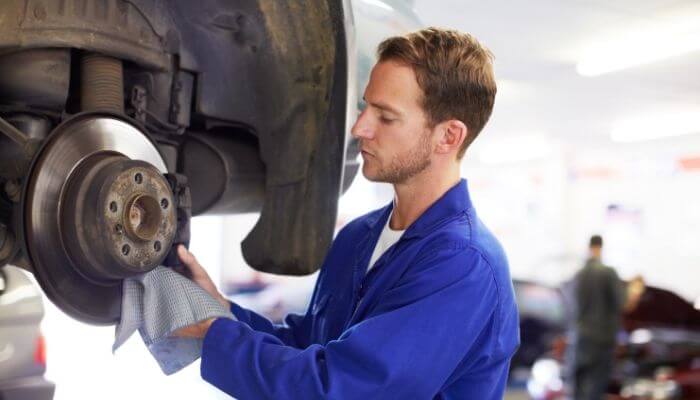
There’s no way to know the exact mileage you’ll get, but the type of noise and the volume can give you more clues.
Very noticeable, loud noise is often a sign of serious damage that you should try to get checked out as soon as possible.
Remember that you’ll never know for sure how long wheel bearings will last after they start making noise. Your driving conditions and the vehicle itself will have a big impact on how long you can drive before they fail completely.
What Does the Wheel Bearing Do?
Wheel bearings are located in the wheel hub, the hollow part inside the wheel. They connect the axle to the wheel, allowing the wheel to rotate freely and reducing friction when the wheel is spinning.
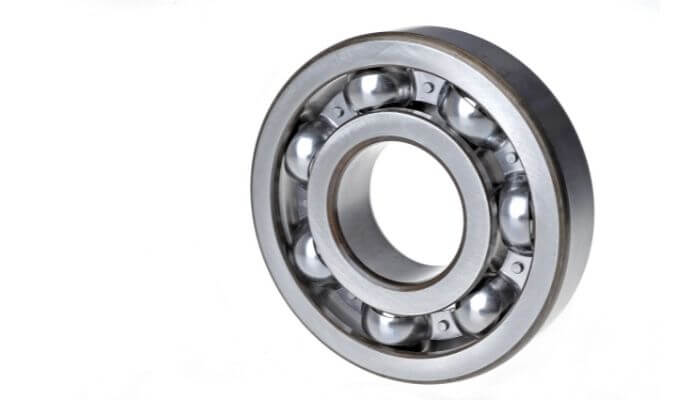
They usually consist of a set of steel balls inside a metal ring, but you might also have tapered bearings, also called “roller” bearings. Roller bearings include small cylinders instead of balls, and they’re inside a tapered ring.
This small part of the wheel’s assembly is crucial for braking and turning, as well as keeping the wheel smoothly in motion. It’s important to make sure the wheel bearings are in good condition, and any noises are a sign that their movement is partially blocked.
What Kind of Noise Does the Wheel Bearing Make?
Wheel bearings usually make noise when they’re worn, dirty, or lacking lubrication, or a combination of these factors. But what kind of a sound does the wheel bearing make when it’s in bad shape?
One common noise you might hear, especially when cornering or braking, is clicking or snapping. This is usually the first indication that you should get your wheel bearings checked out.
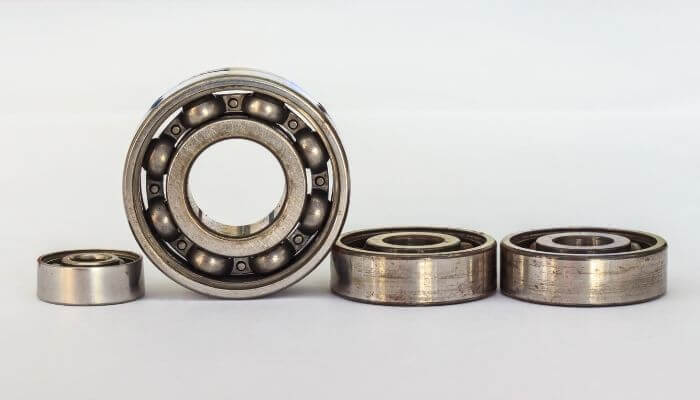
Another possibility is that you’ll start hearing a low buzzing or rumble. It will be louder when you make turns, but you’ll probably hear it when driving straight ahead. The noise may also get louder at higher speeds.
There might also be a grinding sound. This should alert you to get your car to a mechanic immediately.
Also Read: How To Soundproof A Car & Reduce Road Noise
What Are the Risks of Worn Wheel Bearings?
Getting your car checked and changing your wheel bearings is important, not just because the noise is annoying.
It will keep you safe, as well as prevent other expensive repairs in your vehicle in the long run.
Worn Wheel Bearings Are Unsafe
The number one reason for changing your noisy wheel bearings to new ones immediately is safety.
Wheel bearings are a small but important part of your vehicle that essentially keeps the wheels turning smoothly.
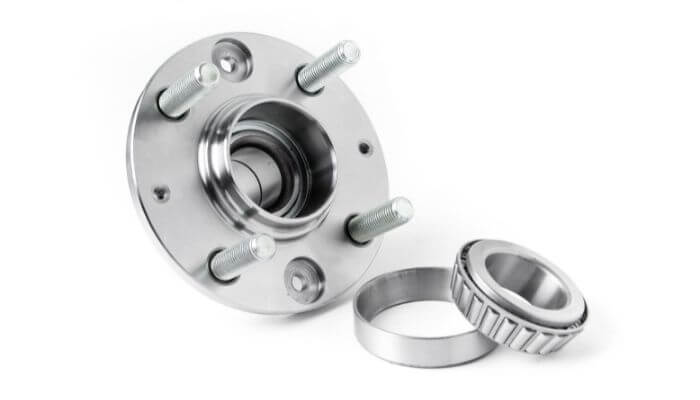
If one of them gets blocked by dirt or lack of lubrication, it might eventually stop the wheel from rolling altogether as you’re driving.
This will make you lose control of your vehicle, causing an extremely dangerous situation when you’re driving.
They Can Cause Uneven Tire Wear
Your tires might quickly start showing uneven wear if your wheel bearings are old and worn. When one of the wheels is not rolling properly, the balance of your car will be altered, and this will add unnecessary friction to your tires.
Unevenly worn tires can put you at risk of a dangerous blowout, not to mention the fact that they are far noisier to drive on and you’ll spend more changing them because of the early wear.
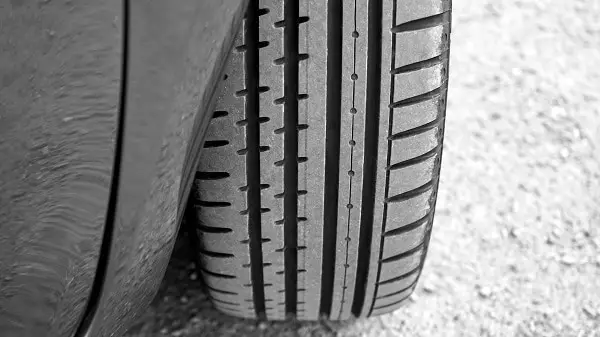
Check up on your tire wear regularly to keep track of their condition and rotate your tires at least every six months.
This will help extend their life cycle, and it also allows you to spot any issues before they get serious.
Also Read: Best Quiet Tires For A Peaceful Drive
Increased Fuel Consumption
When you’ve got a problem affecting your drivetrain, it will also impact your fuel economy.
Worn, noisy bearings make your vehicle lose efficiency when turning the wheels, so changing them for new ones can save you some money.
Can Cause Brake Misalignment
Wheel bearings also keep your brake rotors aligned.
If they’re loose or worn, it can cause your brake pedals to wear out quicker, adding another repair to the list.
Worn Axles
Eventually, the bad wheel bearing can impact your drivetrain in massive ways. The axles can get worn, which can eventually lead to total failure.
It’s always best to take care of any noises to prevent causing a dangerous situation to yourself or others.
Taking care of issues like worn wheel bearings as they appear is also cheaper than the repairs you’ll need to make on your vehicle if the damage gets bigger.
How Long Will Wheel Bearings Last?
Wheel bearings on passenger cars usually last around 100,000 miles.
If your car is getting close to this mileage, pay close attention to any noises coming from the wheels or get it checked out to prevent problems.
Rough conditions can create more stress and wear on the wheel bearings.
Other issues that alter the balance of your car, including driving in old, worn-out tires, can deteriorate the bearings faster.
Still, wheel bearings are generally a part of your vehicle that doesn’t require too much maintenance.
What Makes Wheel Bearings Wear Out?
Like everything else, wheel bearings do simply wear out over time like everything else.
However, there are a couple of factors that may cause your wheel bearings to have a shorter life span.
Poor Weather Conditions
In areas with a lot of rainfall, snow, and sleet, everything tends to wear out a little faster.

Wheel bearings are usually made from high-quality steel and sealed to prevent moisture from getting in.
Over time they might still lose their lubrication and become rusty. Road salt on wintery pavement can contribute to this process, increasing the risk of corrosion on your car.
Bad Roads
If you drive on poorly-conditioned roads a lot, you probably already know it can do a lot of damage to your vehicle.
When the car takes on lots of bumps, the wheels will have a bit more movement than the rest. After all, they’re the part that has to take in the biggest impact from the road.
Even if you try to be as careful as possible, the wheel assembly will likely suffer from potholes and other irregularities.
Driving Style
If you’re careless and tend to drive over speed bumps and potholes at a high velocity, you might notice your wheel bearings getting worn out pretty fast.

If you want them and the rest of your car to last as long as possible, you’ll need to be more careful. Stay alert and avoid speeding to get the most out of your vehicle.
Bad or Reused Parts
Cheap, poor-quality parts will often last a fraction of the time of good ones.
And if you’ve installed previously used parts on your car to save a little money, just remember they probably won’t last as long as new ones.
If you know either one of these situations to apply to your car, pay extra attention to any noises you might hear when driving. Your faulty wheel bearing might be in really poor condition.
Poor Installation
If you had your wheel bearings installed by a beginner mechanic or you did it yourself, it’s possible you’ve made a mistake, and in a spot like a wheel hub that has a lot of heat and friction, a faulty installation might very quickly wear out the bearing.
How Much Does It Cost To Replace a Wheel Bearing?
Getting a wheel bearing replaced usually costs between $300 and $400 for just one wheel, but the parts are usually much cheaper.
Still, we recommend going to an experienced technician.
The fix can take anywhere from 15 minutes to an hour, but it’s not necessarily simple, and poor installation can cause you more problems.
The Bottom Line
If your wheel bearings start making clicking, buzzing, or grinding noise, it’s time to head to a mechanic. How long will a wheel bearing last after it starts making noise?
You might get around 1,000 to 1,500 miles on it before it fails completely, but it’s never safe to drive on a worn-out wheel bearing.
Getting a noisy wheel bearing changed might not be the cheapest fix, but it can prevent other, bigger repairs.
A noisy wheel bearing is also always at risk of dangerous failure, so to protect yourself and others, we recommend getting it repaired immediately.
As an Amazon Associate I may earn a small fee from qualifying purchases at no extra cost to you. This helps us run the site, so thanks for your support!
